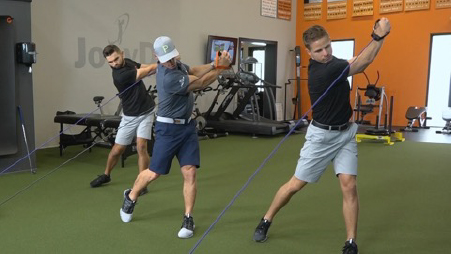Golf, often seen as a leisurely sport, requires substantial physical and mental fitness. From driving long distances to maintaining balance and coordination, golfers need a unique blend of strength, flexibility, and endurance.
Incorporating a dedicated golf fitness regimen can significantly enhance performance on the course, reduce the risk of injury, and improve overall game enjoyment.
The Importance of Physical Fitness in Golf
Physical fitness plays a crucial role in golf for various reasons. Firstly, it enhances a golfer’s ability to generate power and control shots, leading to better accuracy and longer drives. A well-conditioned body can sustain the repetitive motions of a golf swing without succumbing to fatigue, which is essential for maintaining performance throughout a round.
Moreover, physical fitness reduces the risk of injuries common among golfers, such as lower back pain, shoulder injuries, and tendinitis.
Key Areas to Focus On
Developing a golf fitness program involves concentrating on several key areas. Strength, particularly in the core, legs, and upper body, helps generate power and stability in the swing. Flexibility, especially in the hips, shoulders, and spine, allows for a full range of motion, which is crucial for an effective golf swing.
Good balance and stability enable control and precision during the swing, while cardiovascular endurance helps sustain energy levels throughout an entire round of golf. Addressing these areas ensures a comprehensive approach to golf fitness.
Essential Exercises for Golfers
Incorporating specific exercises into a fitness routine can significantly enhance golf performance. Core exercises such as planks, Russian twists, and medicine ball rotational throws strengthen the core muscles, improve stability, and build explosive power. Lower body exercises like squats, lunges, and leg presses build strength in the legs and glutes, providing a stable base.
Upper body exercises, including push-ups, dumbbell rows, and shoulder presses, enhance back and shoulder strength, contributing to a powerful and controlled swing. Flexibility exercises, such as hip flexor stretches, torso rotations, and hamstring stretches, maintain mobility and prevent injuries.
Moreover, golf fans can also bet on gold to get motivated. Before engaging in betting, using the BetMGM bonus code can unlock exclusive welcome bonuses.
Creating a Golf-Specific Workout Routine
A well-rounded golf-specific workout routine should incorporate strength training, flexibility, and cardiovascular fitness elements.
For example, a sample weekly plan might include lower body strength training on Mondays, core exercises and flexibility training on Tuesdays, cardiovascular exercise on Wednesdays, upper body strength training on Thursdays, core and flexibility training again on Fridays, active recovery on Saturdays, and rest or light activity on Sundays.
Nutrition and Hydration for Golfers
Proper nutrition and hydration are vital for maintaining energy levels and optimizing performance on the golf course. Golfers should drink plenty of water before, during, and after a round to prevent dehydration, which can impair concentration and physical performance. Consuming a balanced meal with carbohydrates, protein, and healthy fats 2-3 hours before playing can provide sustained energy.
On the course, healthy snacks such as nuts, fruit, or energy bars help maintain energy levels. After a round, eating a meal rich in protein and carbohydrates aids recovery, promoting muscle repair and replenishing energy stores.
Preventing Injuries and Recovery Strategies
Injury prevention and recovery are essential components of a golf fitness program. Warm-up routines that include dynamic stretches and light cardio prepare muscles and joints for the demands of golf. After a round, performing static stretches can aid recovery and prevent stiffness.
Adequate rest between workouts allows the body to recover, reducing the risk of overuse injuries. Working with a fitness trainer or physical therapist specializing in golf can provide personalized guidance and address specific issues, ensuring a tailored and effective fitness regimen.
The Role of Mental Fitness in Golf Performance
Mental fitness is as important as physical fitness in golf. Visualization, mindfulness, and relaxation can enhance mental toughness and focus. Visualization involves mentally practicing successful shots and positive outcomes, which can boost confidence and performance.
Mindfulness and relaxation techniques, such as meditation and deep breathing, help manage stress and maintain concentration.
Setting realistic and achievable goals keeps golfers motivated and provides a clear path for progress, contributing to overall mental resilience and performance.
Conclusion
Golf fitness encompasses a holistic approach that includes strength, flexibility, endurance, nutrition, injury prevention, and mental fitness. By focusing on these areas and incorporating specific exercises and training strategies, golfers can enhance their performance on the course, reduce the risk of injuries, and enjoy the game to its fullest.
Whether a seasoned golfer or a beginner, a dedicated fitness program tailored to golf can significantly improve the game, ensuring a healthier and more enjoyable golfing experience.


